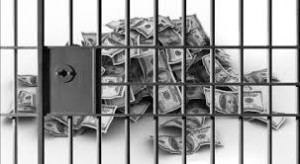Crime pays: Hundreds of Wisconsin inmates collect unemployment

By M.D. Kittle | Wisconsin Reporter
MADISON, Wis. — Who says crime doesn’t pay?
Hundreds of inmates in Wisconsin’s jails and prisons fraudulently collected unemployment insurance benefits in the last fiscal year, according to data obtained by Wisconsin Reporter through an open records request.
There was, however, a marked decline of jailbirds cashing illegal unemployment checks from the previous year, a sign that initiatives aimed at catching fraud in the state Unemployment Insurance Division are paying off, according to the Wisconsin Department of Workforce Development.
BENEFITS BEHIND BARS: More than $425,000 in jobless benefits was paid out in the names of Wisconsin inmates last year, according to information obtained by Wisconsin Reporter in an open records request.
Between July 1, 2013, and the end of last month, the agency “established” 371 cases of unemployment insurance “overpayments” to incarcerated individuals — to the tune of $425,506, according to DWD.
That’s down 37 percent from the previous fiscal year, through June 30, 2013, when the agency tracked 593 cases of jobless benefits paid in the names of Wisconsin prisoners, at a total cost to employers and taxpayers pegged at north of $600,000.
DWD spokesman John Dipko said expanded collaborations with correctional officials over the past few years are helping slam the door on unemployment fraud behind bars.
“We also continue to use inmate data cross-match technology to match records with Social Security Administration records for incarceration,” Dipko said in an email. “We are working this summer to improve upon our current cross-match technology and flag potential cases even more quickly than we do now.”
Unemployment compensation programs are administered by the states and funded by payroll taxes employers pay.
The agency uses a variety of collection methods to recover overpayments, including fraud, such as direct billing, levies, warrants and tax refund intercepts, Dipko said.
“If an individual files a legitimate claim in the future, we can deny, reduce or offset those payments by the previously unwarranted amount,” the spokesman said.
Unemployment Insurance Division agents have recovered $767,519 in illegal payments to inmates since 2010, according to DWD data.
Gov. Scott Walker last year signed into law Act 36, designed to strengthen the Unemployment Insurance Division’s ability to hold all UI claimants accountable for sharing their PIN information in fraud cases. Unemployment officials say much of the fraud is committed when a family member or friend reports an unemployment claim on behalf of the convict. Pocketing unemployment on behalf of an inmate is against the law.
“Should an inmate share his or her PIN with a spouse, significant other, mother or other family member or friend while incarcerated and fraud occurs, we will be able to hold the inmate responsible for the overpayment,” Dipko told Wisconsin Reporter last year. “That is a change from current law and should continue to support our fraud detection and recovery efforts.”
In 2013, the Department of Workforce Development recovered funds equal to 97 percent of all benefits, including unemployment payouts issued due to fraud, Dipko said. The agency recovered $23.9 million in fraud overpayments compared to $24.7 million in established illegal payments.
That’s a sliver of the $1.2 billion in total state and federal unemployment insurance benefits DWD paid out last year.
Fraud trackers say there certainly is more fraud out there than is being detected, but expanded resources and technologies in the fraud fight are helping to safeguard taxpayer and employer dollars.
The numbers have fluctuated in recent years, however. Data obtained by Wisconsin Reporter in July 2012 found 406 inmates scammed unemployment benefits from July 2011 to July 2012.
There are instances in which inmates could be eligible for unemployment benefits. Inmates held at county jails for a short time such as 48-hour holds, or who are permitted to leave jail and look for work and are considered able and available to work, could legally be eligible for unemployment insurance if they are unemployed, Dipko has said.







